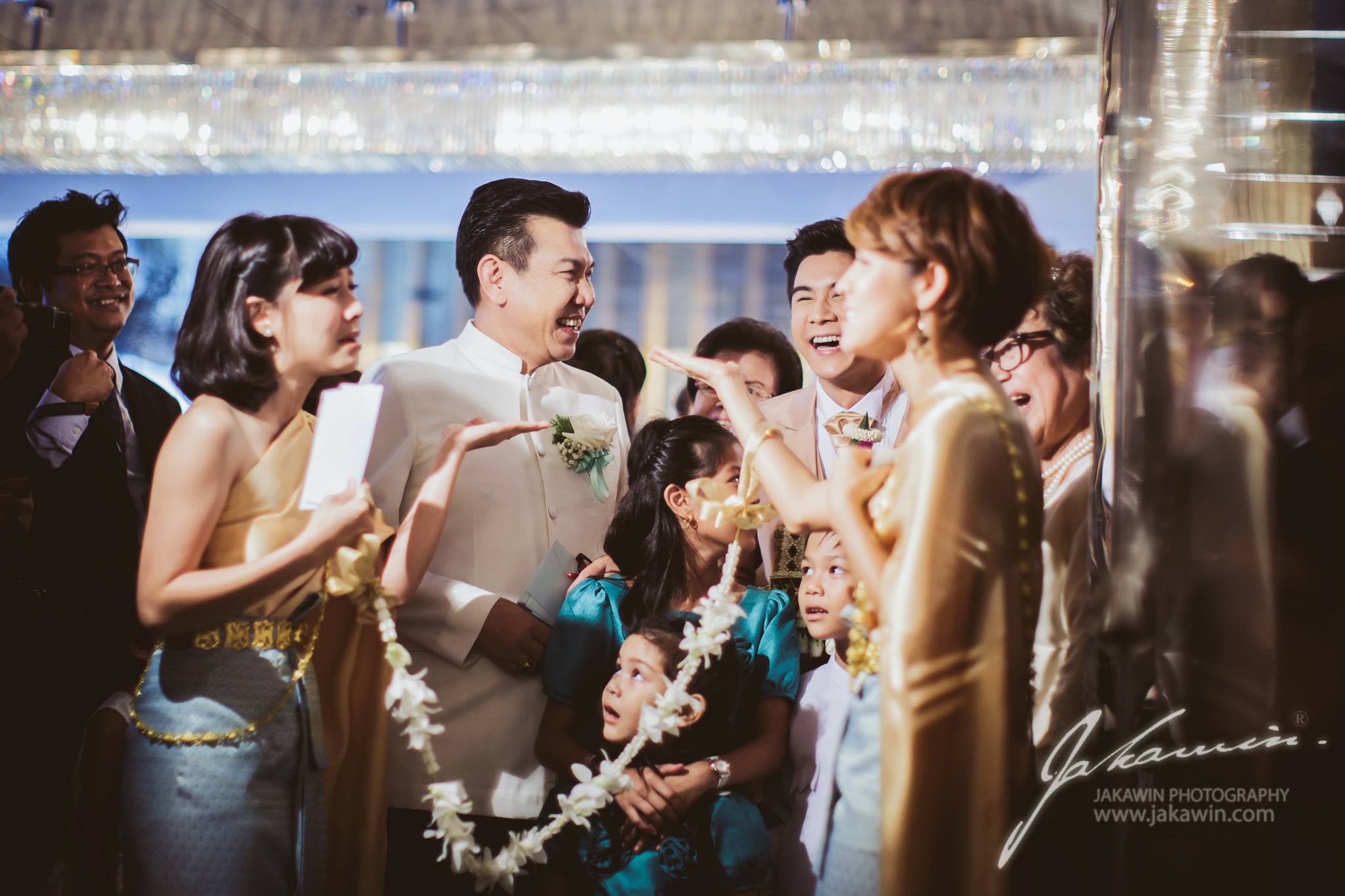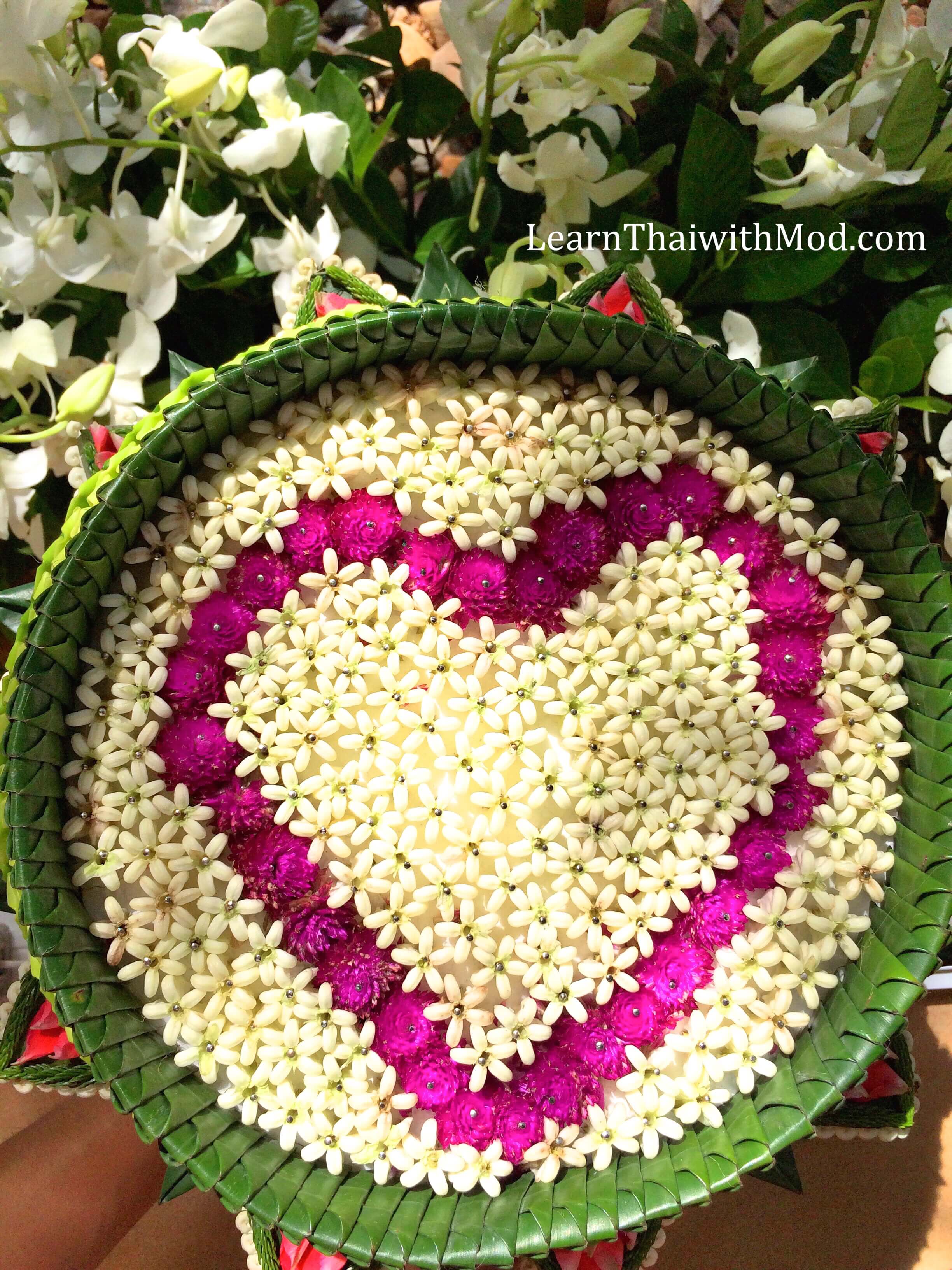This morning I was in a mood for cooking. I decided to cook my favourite egg dish which is called in Thai "Kai Luuk Koei" (ไข่ลูกเขย) Kai (low tone) [ไข่] means egg Luuk (falling tone) - Koei (rising tone) [ลูกเขย] means son-in-law So, Kai Luuk Koei means son-in-law eggs! Funny name, isn't it? Kai Luuk Koei made from deep-fried hard boiled eggs, which have been cut into … [Read more...] about Learn Thai from Thai food : Son-in-law eggs
Speak Like a Thai
Thai Traditional Wedding Ceremony – symbolic doors
Barring the Groom from approaching the Bride (พิธีกั้นประตู) In order for the wedding to continue, the groom must bring the bride from her room to join him for the engagement ceremony. However, before this can happen, the groom must successfully pass through a number of obstacles that are put in the groom’s way by the bride’s family. These symbolic “doors” can only be entered … [Read more...] about Thai Traditional Wedding Ceremony – symbolic doors
Learn Thai – Sepak Takraw
Sawatdii ka, Do you know Sepak Takraw? Last Satureday I saw a group of taxi motorcycle riders in my soi playing Sepak Takraw on the side of the street, so I thought I needed to find out more about this and share in my blog. Sepak Takraw (เซปักตะกร้อ) was created by the royal family of Malaysia about 500 years ago. The name itself comes from two languages. Sepak is "kick" … [Read more...] about Learn Thai – Sepak Takraw
VIDEO: Sweet Thai Words for Your Valentine’s Day ♥
sawatdii ka, Love is in the air, it is the month of LOVE. I would like to take this opportunity to talk about some expressions that you could use on your lovely day or actually anyday;) Valentine's day is the day of love so in Thai it is called "wan hàng kwaam rák" วันแห่งความรัก 1. Pŏm rák kun [ผมรักคุณ] (male speaker), Chán rák kun (female speaker) [ฉันรักคุณ] = I … [Read more...] about VIDEO: Sweet Thai Words for Your Valentine’s Day ♥
Speak like a Thai – Polite particle ‘jâ’
Sawatdii kâ, Thai language has a lot of polite particles. Today I would like to talk about the polite particle "jâ" (falling tone) จ้ะ. "jâ" used by adult male&femail speakers at the end of a statement when speaking to children and people of inferior status; between males and females denotes anything from easy familiarity to 'sweet talk'; between females signals 'best … [Read more...] about Speak like a Thai – Polite particle ‘jâ’
Chinese New Year in Thailand
Sawatdii ka, One of the important festivals in Thailand is coming up soon, Chinese New Year. (Wan trut jiin) วันตรุษจีน Every year, many people in Thailand with Chinese ancestors, celebrate the Chinese New Year with elaborate ceremonies. This year which is the year of the rabbit starts on February 3, 2011. It is the tradition that every family thoroughly cleans the house to … [Read more...] about Chinese New Year in Thailand
Learn Thai – Order food
Sawatdii ka everyone, Last week I made a video about polite request used in a restaurant and also wrote a blog about top 5 Thai food. After that I have got a question asking how to ask for something without mushrooms, so I got to share this to everyone as well. Firstly, let see what a waitor or waitress will say to you: Ao à-rai dii ká/kráp? Or sàng à-rai dii ká? Or … [Read more...] about Learn Thai – Order food
Simple repitition of adjective
Hi everyone, One thing that Thai language is different from other languages is we use "reduplication" Reduplication (the repetition of a word, either in part or full) is another common method of modifying the meaning of adjectives in Thai. The two main forms of adjectival reduplication are simple repetition of the adjective and repitition of the adjective with tonal … [Read more...] about Simple repitition of adjective
Facebook – Learn Thai with Mod
Hi everyone, Now you can also join us here for more Thai language tips; www.facebook.com/learnthaiwithmod … [Read more...] about Facebook – Learn Thai with Mod
Requests for information
Hi everyone, Basic reuests for information can be prefaced by "kŏr-tôot " (excuse me) However, please always remind yourself to use polite particle for politenessas below: "kŏr-tôot kráp" for males. "kŏr-tôot kâ" for females. Example: kŏr-tôot kráp/kâ, hôrng-nám yùu tîi-năi kráp/ ká ขอโทษครับ/ค่ะ ห้องน้ำอยู่ที่ไหนครับ/คะ Excuse me, Where is the … [Read more...] about Requests for information
Learn Thai – Possessive pronouns & Possessive adjectives
Hi everyone, From my previous blogs you now know a lot of Thai pronouns, then let's see how we form possessive pronouns. It is very easy :) The possessive pronouns 'mine', 'yours', 'his', etc. are formed using the following; kŏrng + personal pronoun mine = kŏrng chán (ของฉัน) yours = kŏrng kun (ของคุณ) kŏrng kun sǔay ของคุณสวย Yours is beautiful. rót nán kŏrng … [Read more...] about Learn Thai – Possessive pronouns & Possessive adjectives
More personal pronouns
Hi everyone, Let's continue from my last blog about basic Thai pronouns:) Thais will use much wider range of pronouns than those given in the last blog. Some of these are given below with an indication of whether they are specifically male (M) or female (F) pronouns and the context in which they are used; certain first person pronouns are normally 'paired' with a specific … [Read more...] about More personal pronouns
Personal pronouns : basics
Hi everyone, Thai has many more personal pronouns than English; age, social status, gender, the relationship between the speakers, the formality of the situation and individual personality all play a part in helping a Thai to decide the most appropriate way to refer to him/herself and address and refer to others in any situation. Kin terms such as dad, aunt, child … [Read more...] about Personal pronouns : basics
VIDEO: Thai Greeting
Hi everyone, From my last post we learned how to say hello in Thai, so let's continue from there. Let's begin your first Thai conversation with this nice and lovely greeting question . sà-baai-dii mái? (สบายดีมั้ย?) means 'How are you?' or to translate directly to English it means 'Are you fine?' The response to sà-baai-dii mái? is sà-baai-dii (สบายดี) which means 'I … [Read more...] about VIDEO: Thai Greeting
Make people love you with “polite particles”
Hi everyone, I understand that non-Thais sometimes feel that the polite articles don't mean anything so you forgot to use it, or just think they are not important. Polite particles are added to the end of a sentence to show respect to the address and more importantly, it shows that you know how to speak the nice Thai way and that give people impressions. Also personnally, I … [Read more...] about Make people love you with “polite particles”
Sawatdii
Sàwàtdii kâ This blog is here for all Thailand newbies, welcome:) Sà-wàt-dii is the greeting word that everyone will hear wherever you go in Thailand. The word is spoken with the Wai, indicated by pressing your palms together near your chest and bowing. The word is also spoken as a farewell as well. Sà-wàt-dii is always added by polite particles to show respect to the … [Read more...] about Sawatdii


